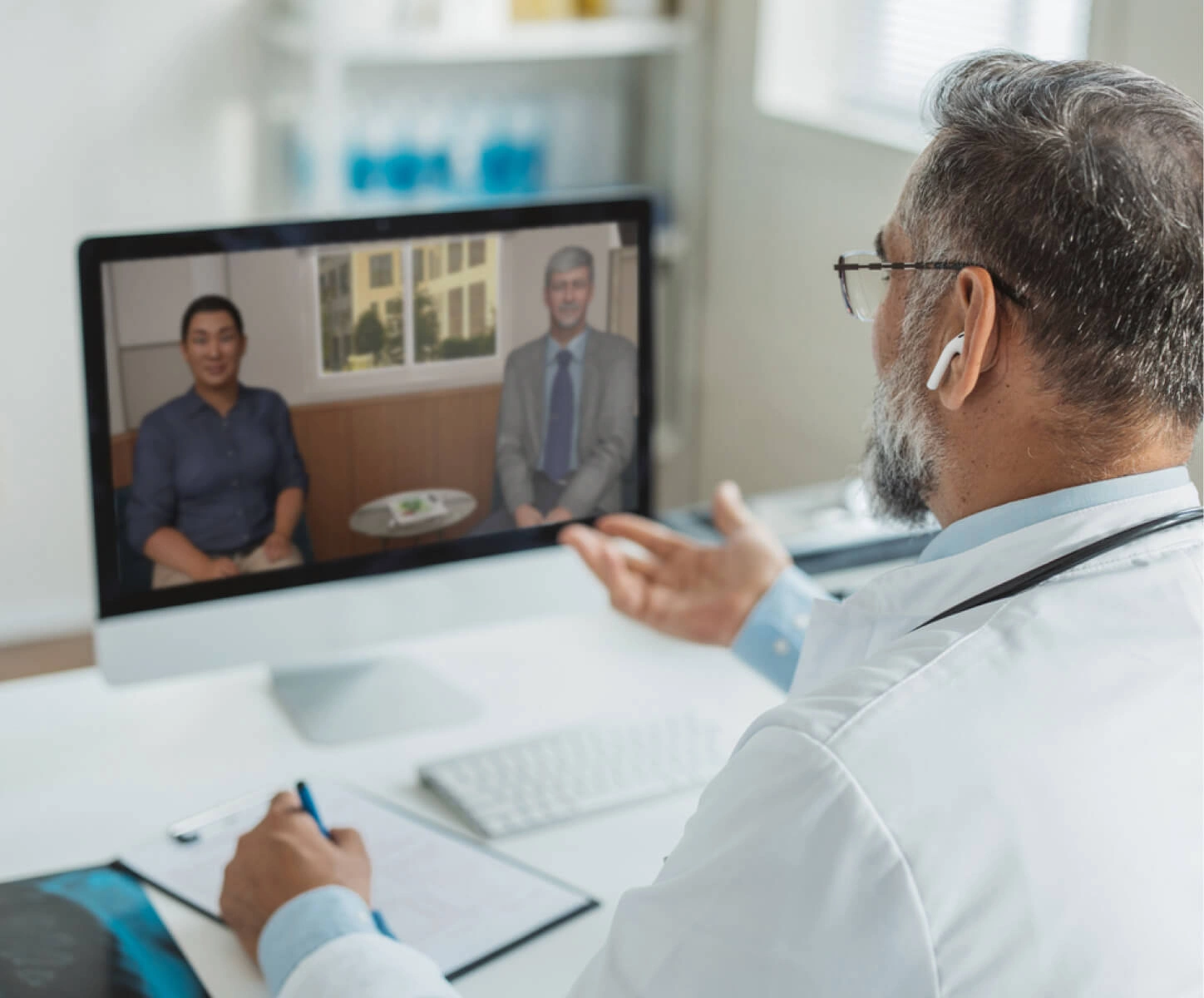Solutions for Healthcare
Skills training for the human side of healthcare
Behind every chart and diagnosis is a human story. The way your medical staff listen, connect, and communicate makes the difference between feeling cared for and simply being treated. Mursion helps you make that difference.

Training teams at

Turn practice into
better outcomes with clinical skills simulations
Better communication means better care. Mursion’s immersive, AI-powered simulations give healthcare teams a supportive, risk-free space to rehearse the conversations that shape patient experience—building clarity, empathy, and trust.
Grounded in behavioral science, this proven approach leads to measurable improvements, including up to 23% higher patient satisfaction and 38% fewer communication breakdowns. The result: more effective care delivery and greater confidence for staff in every interaction.
Stronger communication leads to safer, more compassionate care
23%
Increase that hospitals see in HCAHPS scores from stronger communication skills
38%
Fewer critical breakdowns in high-stress scenarios when teams improve communication
70%
Of malpractice cases involve communication breakdowns
$400k
Average cost per malpractice claim
Build the human skills that elevate healthcare and patient outcomes
Healthcare isn’t only about procedures—it’s about people.
Mursion equips professionals with the communication and collaboration skills that ensure
patients feel cared for and caregivers feel supported, even under pressure.
Make every patient feel cared for and understood
Help patients feel genuinely seen, heard, and understood through clear, compassionate communication. Mursion simulations build the listening, empathy, and clarity that turn treatment into care and improve key patient experience metrics.
Empathetic listening: Show patients they’re heard and valued.
Clear communication: Explain care plans simply and clearly.
Trust and safety: Combine skill with compassion to build confidence.
Inclusive care: Adapt communication to each patient and family member.


Prepare caregivers for any challenge with confidence
When the stakes are high, confidence and composure make all the difference. Mursion helps clinicians and care teams rehearse real-world interactions to strengthen teamwork, resilience, and readiness for the unexpected.
Composure under pressure: Stay calm and clear in high-stress situations.
Collaborative care: Communicate seamlessly across roles.
Emotional resilience: Maintain empathy and professionalism under stress.
Proactive problem-solving: Anticipate challenges and respond decisively.
AI-POWERED + PATIENT-READY
Training tailored for healthcare, grounded in science
Manuals can teach protocols, but they can’t replicate the pressure of a real emergency or the sensitivity of a difficult diagnosis. Grounded in behavioral science, Mursion simulations combine multimodal AI, human insight, and data-driven feedback to help healthcare teams build instincts, confidence, and communication skills that translate into better patient outcomes and fewer costly mistakes.
Realistic practice, lasting impact
Teams rehearse lifelike, high-pressure scenarios that sharpen instincts and improve decision-making in the moments that matter.
Practice without real-world risk
Professionals can refine their communication approaches—whether delivering tough news or coordinating under pressure—without jeopardizing patient trust.
Feedback that accelerates growth
Targeted, in-the-moment feedback strengthens empathy, clarity, and confidence across every interaction.
Scalable and consistent learning
Spot and resolve issues early to protect relationships and reduce costly complaints. From one unit to the entire organization, simulations deliver a consistent standard of communication, teamwork, and care.
Skills that stick
Repetition turns empathy, adaptability, and conflict resolution into second nature—boosting patient satisfaction, reducing burnout, and equipping staff to stay resilient in high-stakes healthcare environments.

Exceptional care demands practiced presence
Protocols alone can’t prepare staff for the realities of patient care. Breaking bad news, de-escalating conflict, or leading under pressure requires composure and skill built through practice.
Mursion immerses clinicians in lifelike scenarios that mirror real clinical encounters, so they can respond with confidence, empathy, and precision in the moments that matter most.
Frequently Asked Questions
Traditional training; manuals, lectures, or one-time workshops can’t fully prepare clinicians and staff for the interpersonal challenges of real-world care. Mursion simulations offer something different: immersive, lifelike practice in a supportive, risk-free environment. Whether it’s a conversation in the exam room or a team discussion in the conference room, users build confidence and sharpen the communication, empathy, and decision-making skills that help them thrive wherever the moment matters most.
Mursion simulations cover a variety of high-stakes healthcare interactions like delivering difficult news to families, leading team huddles, or de-escalating tense situations with patients or colleagues. These scenarios focus on strengthening communication, patient education, conflict resolution, collaboration across roles, and compassionate care.
Yes. Whether for physicians, nurses, allied health professionals, or administrative staff, simulations strengthen human skills—like communication, empathy, teamwork, and resilience—that directly impact patient outcomes and workplace culture.
Mursion combines AI precision with live human facilitation to replicate the complexity of real healthcare conversations. Our scenarios adapt in real time based on what’s said so users can practice responding to patient and colleague dialogue in ways that feel authentic and directly applicable to clinical settings.
It feels like the real thing. Participants engage with hyper-realistic avatars in scenarios modeled after actual clinical situations. They make decisions, communicate under pressure, and receive instant feedback—all without risking patient safety.
Not at all. Simulations are designed for every level of experience—from medical students to seasoned providers—providing a structured, supportive environment to learn, experiment, and grow.
Yes. Immediate, targeted feedback is built into every session, giving healthcare professionals the opportunity to refine their skills on the spot and apply insights directly in their practice.
Healthcare organizations that invest in simulation training report up to 23% higher patient satisfaction (HCAHPS scores), 38% fewer communication breakdowns, stronger staff retention, and reduced malpractice risk—directly impacting both patient outcomes and organizational performance.
Simulations provide more practice in less time, reducing the need for extended classroom hours or on-the-job trial and error. This efficiency lowers training costs while improving preparedness and reducing costly mistakes.
Yes. Our programs are designed to align with your priorities, whether that’s improving patient experience, reducing errors, supporting clinician well-being, or strengthening interdisciplinary collaboration, so every session connects directly to your outcomes. We work closely with you to shape the right learning focus and ensure measurable impact.
They bridge the gap between theory and practice. While technical training ensures clinical competence, simulations provide the space to master the human side of healthcare—ensuring staff can apply knowledge with empathy, clarity, and confidence.
Let’s team up
Ready to transform every interaction?
Discover the power of immersive skill-building.